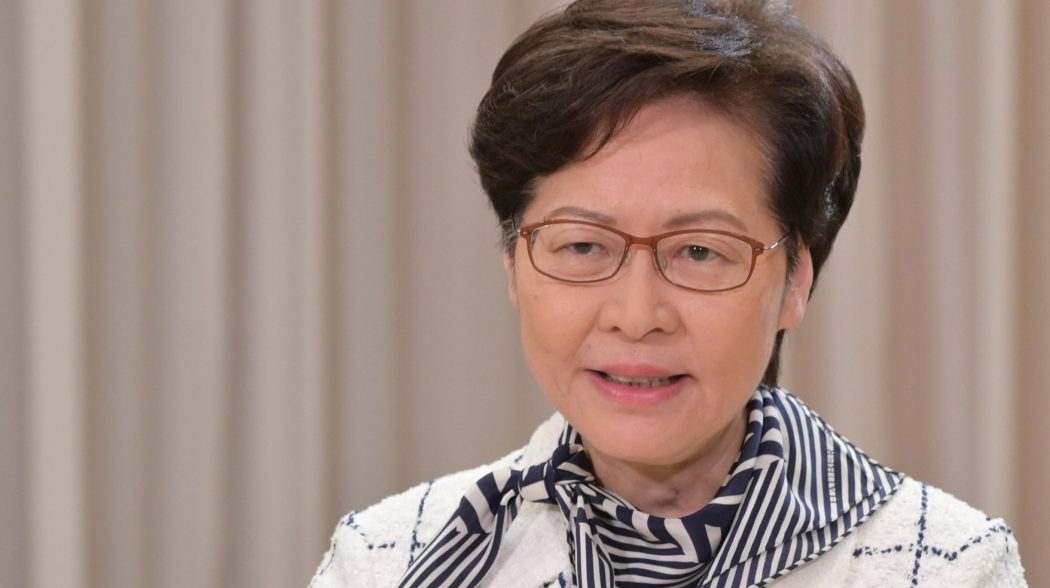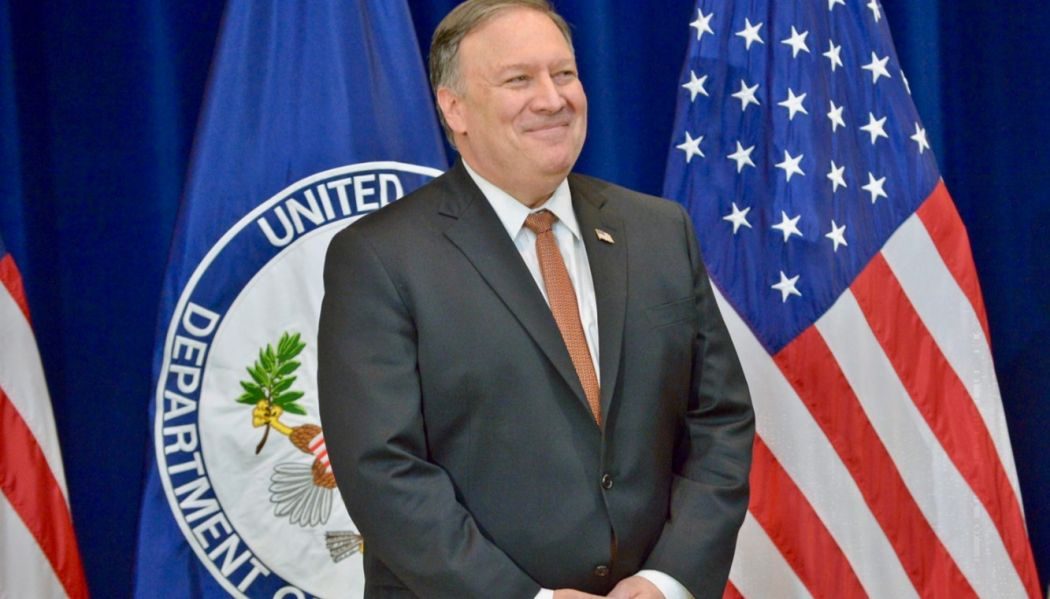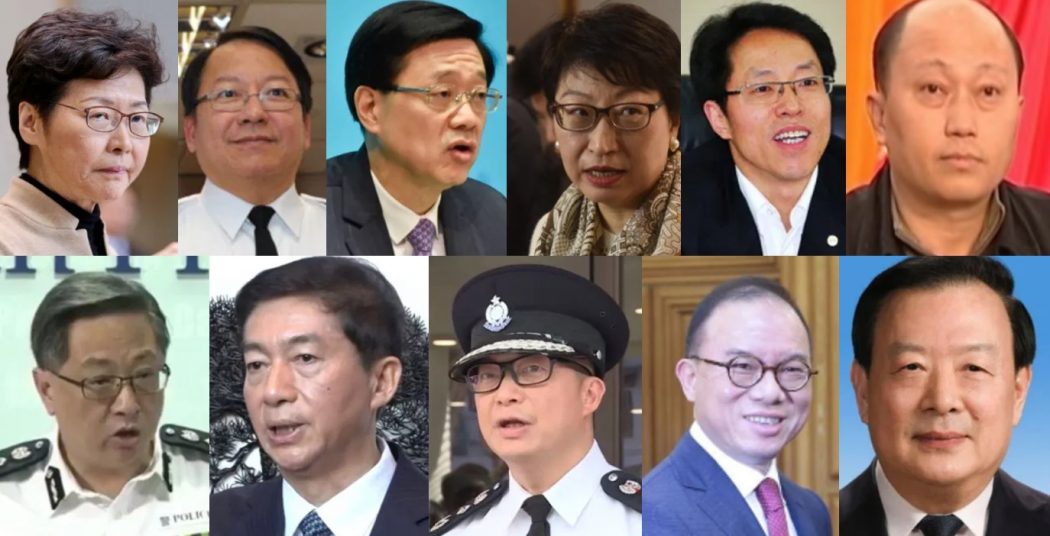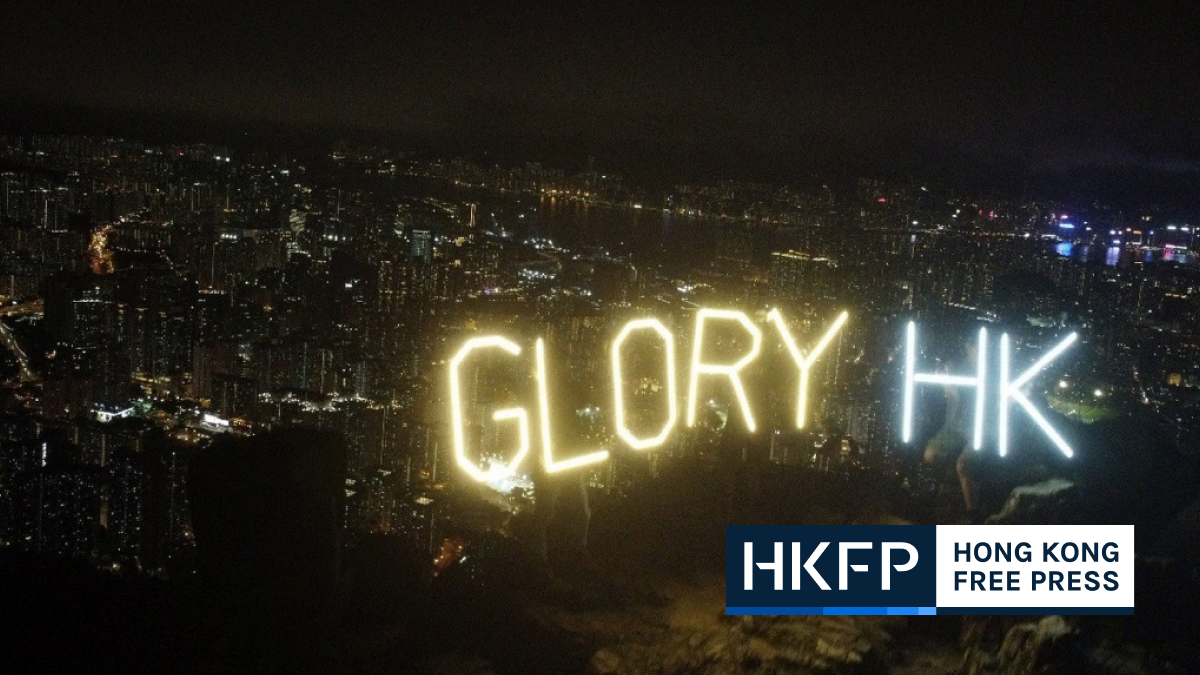The United States on Friday slapped sanctions on Hong Kong’s leader Carrie Lam and 10 senior figures, in a major new step against China’s clampdown in the semi-autonomous city.

In the most significant US action since China imposed a tough security law, Lam and the other leaders of the Asian financial hub will have any assets in the United States blocked.
The move also criminalises any US financial transactions with them.
“The United States stands with the people of Hong Kong and we will use our tools and authorities to target those undermining their autonomy,” Treasury Secretary Steven Mnuchin said in a statement.
The US treasury department’s reasoning in full – click to view
Carrie Lam, Chief Executive, Hong Kong Special Administrative Region (HKSAR)
Carrie Lam is the chief executive directly responsible for implementing Beijing’s policies of suppression of freedom and democratic processes. In 2019, Lam pushed for an update to Hong Kong’s extradition arrangements to allow for extradition to the mainland, setting off a series of massive opposition demonstrations in Hong Kong. Lam is designated for being involved in developing, adopting, or implementing the Law of the People’s Republic of China on Safeguarding National Security in the Hong Kong Special Administrative Region (National Security Law).
Chris Tang, Commissioner of Hong Kong Police Force (HKPF)
Chris Tang, as the Commissioner of the HKPF, has enthusiastically supported the Hong Kong National Security Law. The HKPF besieged Hong Kong Polytechnic under his leadership, along with arresting hundreds of protestors. Chris Tang also sits upon the newly established Committee for Safeguarding National Security. He is designated for coercing, arresting, detaining, or imprisoning individuals under the authority of the National Security Law.
Stephen Lo, Former Commissioner of HKPF
Stephen Lo was the previous commissioner of the HKPF until 2019. Under his leadership, over 4,000 protestors were arrested and 1,600 injured in clashes. Stephen Lo is designated as a leader or official of a government entity whose members have engaged in activities to prohibit, limit, or penalize the exercise of freedom of expression or assembly in Hong Kong.
John Lee Ka-chiu, HKSAR Secretary for Security
John Lee Ka-chiu is the Secretary for Security in Hong Kong, where his office is responsible for all security-related policies. John Lee Ka-chiu is also a member of the Executive Council of the HKSAR government, an organ for assisting the Chief Executive in policy-making, and has introduced a new police unit dedicated to enforcing the Hong Kong National Security Law which will have intelligence gathering and investigation capabilities. He is designated for being involved in coercing, arresting, detaining, or imprisoning individuals under the authority of the National Security Law, as well as being involved in its development, adoption, or implementation.
Teresa Cheng, HKSAR Secretary for Justice
Teresa Cheng is the Secretary for Justice for Hong Kong. As head of the Hong Kong Department of Justice, Teresa Cheng has said that her major responsibility is implementing and safeguarding national security in the HKSAR. She is designated for being responsible or involved in developing, adopting, or implementing the National Security Law.
Erick Tsang, HKSAR Secretary for Constitutional and Mainland Affairs
In April, Erick Tsang assumed the post of Secretary for Constitutional and Mainland affairs, the office that maintains relations between the HKSAR government and mainland Chinese government. He is designated for being responsible for or involved in developing, adopting, or implementing the National Security Law.
Xia Baolong, Director of the Hong Kong and Macao Affairs Office of the State Council
In February 2020, Xia Baolong was announced as the newest Director for the Hong Kong and Macao Affairs Office, an organization within the State Council designed to assist the premier in dealing with affairs related to Hong Kong and Macao. The Office has stated that it is entitled to supervise affairs in Hong Kong, including implementation of the Basic Law of the HKSAR. Xia Baolong is designated for being a leader or official of a government entity that has engaged in, or whose members have engaged in, actions or policies that threaten the peace, security, stability, or autonomy of Hong Kong.
Zhang Xiaoming, Deputy Director of the Hong Kong and Macao Affairs Office of the State Council
Zhang Xiaoming is former Director and current Deputy Director of the Hong Kong and Macao Affairs Office of the State Council, where he is in charge of daily operations. As Director, he backed the controversial 2019 Hong Kong extradition bill. He is designated for being a leader or official of a government entity that has engaged in, or whose members have engaged in, actions or policies that threaten the peace, security, stability, or autonomy of Hong Kong.
Luo Huining, Director of the Hong Kong Liaison Office
Luo Huining is mainland China’s top official in Hong Kong, as the Director of the Hong Kong Liaison Office. The Liaison Office has claimed that it is entitled to intervene in Hong Kong affairs despite the Basic Law’s prohibition on interference in the affairs which the HKSAR administers in accordance with the Basic Law. Luo Huining is also a National Security Advisor to the Committee for Safeguarding National Security in Hong Kong. He is designated for being a leader or official of a government entity that has engaged in, or whose members have engaged in, actions or policies that threaten the peace, security, stability, or autonomy of Hong Kong.
Zheng Yanxiong, Director, Office for Safeguarding National Security in Hong Kong
Zheng Yanxiong is the inaugural director of the newly created Office for Safeguarding National Security in Hong Kong. The Office was established under the Hong Kong National Security Law and has broad powers to supervise local authorities and directly investigate major cases. As the Office’s Director, Zheng Yanxiong is designated for being a leader or official of a government entity that has engaged in, or whose members have engaged in, actions or policies that threaten the peace, security, stability, or autonomy of Hong Kong.
Eric Chan, Secretary General, Committee for Safeguarding National Security of the HKSAR
Eric Chan, the director of the Chief Executive Office, was appointed by Beijing to be the Secretary General of the Committee for Safeguarding National Security as recently established by the Hong Kong National Security Law. The Committee’s work is not to be made public and its decisions are not subject to judicial review. As such, Eric Chan is designated for being responsible for or involved in developing, adopting, or implementing the National Security Law.
Secretary of State Mike Pompeo said the United States was acting because Beijing had violated its promise of autonomy that it made to Hong Kong before Britain handed back the territory in 1997.

“Today’s actions send a clear message that the Hong Kong authorities’ actions are unacceptable and in contravention of the PRC’s commitments under ‘one country, two systems’ and the Sino-British Joint Declaration, a UN-registered treaty,” Pompeo said.
Washington has already imposed sanctions on Chinese officials involved in the crackdown on Uighur Muslims in the region of Xinjiang.
Top officials
According to the US Treasury website, the list also includes Secretary for Justice Teresa Cheng, national security chief Eric Chan, current police chief Chris Tang, as well as ex-police chief Stephen Lo who oversaw the early months of last year’s protests and unrest. Security chief John Lee, Secretary for Constitutional and Mainland Affairs Erick Tsang and mainland officials Luo Huining and Zhang Xiaoming are also listed.

In June, Beijing enacted laws to prevent, stop and punish behaviours in Hong Kong that it deemed a threat to national security. The legislation was inserted into the city’s mini-constitution, bypassing the local legislature, in order to criminalise subversion, secession, foreign interference and terrorism. The move – which gives police sweeping new powers – alarmed democrats, civil society groups and trade partners, as such laws have been used broadly to silence and punish dissidents in China.

In a statement on Friday, the US consulate in Hong Kong criticised the controversial new law: “[It] was intended to silence democracy advocates and threaten those who engage in even the most routine forms of free speech… It would be an enormous tragedy if it crushed the very openness, diversity, and vitality that are at the heart of what makes Hong Kong so unique.”
Last month, Lam suspended September’s legislative elections for a year citing the Covid-19 outbreak. Democrats have said, however, that the administration acted out of concern that the pro-establishment camp would face a defeat at the polls.
Additional reporting: AFP.
Support HKFP | Policies & Ethics | Error/typo? | Contact Us | Newsletter | Transparency & Annual Report | Apps
Help safeguard press freedom & keep HKFP free for all readers by supporting our team
























